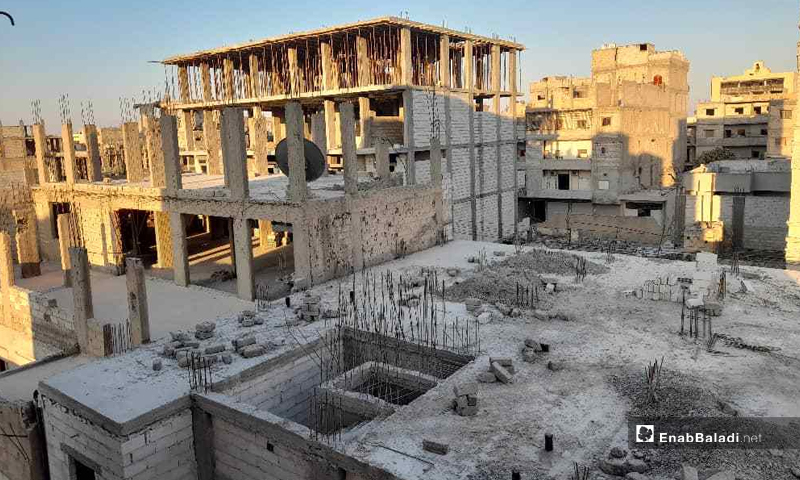Raqqa – Hussam al-Omar
Talal Alwan, 40, refused to deliver a final payment of 7,000 US dollars to the contractor with whom he agreed to buy and divide an apartment in two installments, the first at the time of the agreement and the second at the time of the delivery of the apartment with a price of 14,000 US dollars.
Alwan told Enab Baladi that when he checked out the apartment after its construction was completed, he noticed that the specifications in which it was built were not agreed upon with the contractor before the construction began and that it was not only his problem but all the people who bought apartments in the same building.
Alwan filed a case against the contractor accusing him of defrauding, where he demanded the return of the money he paid for the first time and that he refused to take possession of the apartment and pay the rest of its price as long as the specifications with which the building was built are not agreed upon.
The northeastern city of Raqqa, which is controlled by the Autonomous Administration of North and East Syria (AANES), has recently witnessed the spread of story buildings violating technical and construction specifications, locally called “commercial.”
A number of residents met by Enab Baladi said that they had been subjected to some type of fraud they discovered after they checked out their apartments once the construction was completed.
They also said that the contractor did not allow them to visit the apartments before the end of the construction, only to be surprised that the construction was contrary to the building and technical specifications on which it was supposed to be built.
The residents added that the construction specifications written on paper and agreed upon by those wishing to buy newly built apartments with investors and construction contractors are entirely different from the construction specifications after completion.
Failed control
Sultan al-Hussein, 37, received his apartment despite what he called a “scamming operation” and said that he avoided submitting a complaint because filing legal proceedings against the contractor and obtaining compensation by court decision could take months and possibly years.
Al-Hussein considered that the poor legal oversight by AANES-affiliated institutions was the reason for the growing violations, not only in the construction and building sector but in many other sectors.
Reliance on cheap building materials
Salem al-Adel, 45, a construction contractor in the city of Raqqa, attributed the reasons for the decline in the quality of the newly constructed buildings to the use of cheap materials by the contractors and austerity in the placement of some building materials to avoid rising costs and for the price of the apartment or building to be compatible with the financial of the buyer.
The construction contractor acknowledged that some contractors and investors were scamming their customers and changing the building’s specifications, although there was agreement on the quality of the materials required, but this is a phenomenon that can not be generalized, he added.
Municipality threatens violators
Through the Urban Planning Office, the municipality of Raqqa city monitors the reconstruction taking place in the city, which is limited to the efforts of the owners of the buildings themselves or contractors with whom owners agreed for reconstruction.
The municipality constantly conducts patrols to document violations and stop work in violating buildings, an employee at the municipality told Enab Baladi.
The employee, who declined to be named for private reasons, said that the municipality issued several notifications to contractors and owners of buildings that were built with poor specifications, asking them to demolish the violating structures or repair them and observe the appropriate conditions and specifications.
He also indicated that the municipality, at the same time, takes into account the residents’ desire to rebuild their demolished buildings or build new ones at the lowest possible financial cost on the condition that they do not threaten public safety.
The municipality is accused of overlooking dozens of violations that occur in the city, which are associated with encroachments on public property in exchange for municipal members receiving bribes from real estate dealers and building contractors.
On 6 July 2021, the Higher Technical Regional Committee of the Local Administrations and Environment Authority in the Autonomous Administration of northeastern Syria approved the zoning plan of Raqqa city.
During the committee’s meeting, several files were put forward for discussion, including seven files related to the eastern countryside of Deir Ezzor, two files for al-Tabqa city, and four for Raqqa, according to a statement by the Autonomous Administration.
Some of these files included a modification of some of the urban organizational characteristics, while the urban development plans for the city of Raqqa and the northern railway of the city of Raqqa were also approved.
Most of the houses and buildings of Raqqa city of about 151,000 were partially destroyed, in addition to 40 percent of them completely destroyed after the battles that the city witnessed to expel the Islamic State (IS) in 2017.











